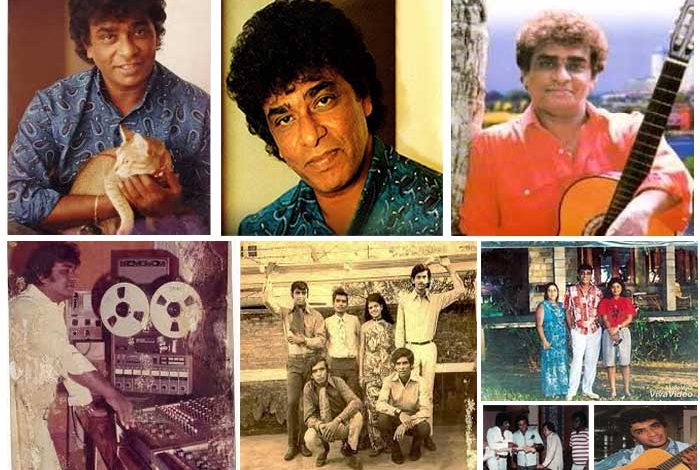Clarence Wijewardena: The Father of Sinhala Pop and the Song Born of a Messenger’s Knock

Clarence Wijewardena is not gone; his songs still breathe among us. Vithana Kuruppu Arachchilage Clarence Arthur Somasinghe Wijewardena—better known as Clarence Wijewardena—was born on 3 August 1943 at Brampton Estate in Haputale, then British Ceylon. From those hill-country beginnings, he would rise to become the undisputed father of Sinhala pop music, a title earned not only for the sheer number of songs he created but for the way he reshaped the soundscape of a nation.
Educated at Weeraparakrama College, Yatawatta, and later at Highland College, Hatton, Clarence at first seemed destined for a planter’s life. But music called louder than tea leaves ever could. Abandoning that career path, he turned to guitar, voice, and melody—a decision that altered the course of Sri Lankan music.
By the mid-1960s, Clarence was already experimenting with the electric guitar, unheard of in Sinhala popular music at the time. In 1965, at the age of 21, he co-founded The Moonstones with Annesley Malewana. Guided by mentors such as Sri Sangabo Corea and Radio Ceylon’s Vernon Corea, the band produced hits like Mango Nanda, Seetha Ude, Menike, and Dilhani. For the first time, young Sri Lankans heard their own language wrapped in rhythms and textures of pop and soft rock.
Later, Clarence formed The Golden Chimes in 1971, and then the legendary Super Golden Chimes in 1973 with Annesley once again at his side. Songs such as Mage Palpathe, Bethlehempure, Kimade Nawe, and Piyaneni sealed his reputation. His music was inventive—introducing guitar wah-wah pedals, Bossa nova rhythms, and harmonic layering that had never been tried in the island before.
Clarence was not just a performer; he was a composer, record producer, music director, and innovator. He wrote for cinema, teledramas (Susima, Nidikumba Mal), national events such as the 1975 Non-Aligned Summit, and even for commercial jingles. Whether it was a radio hit or an advertising tune, Clarence’s melodies lingered long after the first listen.
A Messenger in Ratmalana
Yet his genius was not born only in studios or under stage lights. Sometimes, it sparked from the simplest moments.
One afternoon in the early seventies, Clarence was seated in a small room in Ratmalana, belonging to his friend Chandrasiri. Among those present was journalist Rohana Aryaratna, who often recalled the scene with vivid fondness. The room was filled with young friends, laughter, and idle conversation, while Clarence sat casually strumming his guitar on the bed.
Suddenly, the doorbell rang. A young man stepped outside, then returned. Clarence glanced up.
“Who was that?” he asked.
“A messenger,” came the reply.
Clarence smiled, still plucking strings:
“What is that—maybe a letter? From where?”
“Maybe from the village… maybe from an elder sister.”
For anyone else, the moment would have passed. But Clarence heard a song. Almost instantly, his voice shaped the line that would soon enter the canon of Sinhala pop:
“Gamen liyumak ewilla…”
Rohana Aryaratna, who shared this story many times in later years, never tired of pointing out how swiftly Clarence transformed an ordinary knock at the door into timeless music. It was life itself, distilled into melody.
Married to Sheela Ramadasa, with whom he had a daughter, Clarence continued to create until his untimely death at 53, on 13 December 1996, after a struggle with diabetes-related complications. He was laid to rest at Borella Cemetery.
Even decades after his passing, his songs—Rasa Pirunu Katha, Eatha Ran Wiman, Geeyakin Kese, Naththal Seeya, Thana Nilla Dige—still echo on radio waves, in village fairs, in grand concerts, and in quiet family gatherings. His influence stretches beyond melody; he also contributed to the drafting of Sri Lanka’s Code of Intellectual Property Act of 1979, standing up for the rights of musicians.
Concerts like Unforgettable Melodies of Clarence (Nelum Pokuna, 2017) and the recent 2025 film Rhythm of the Guitar: Clarence are proof that his voice has not dimmed. He remains a presence—both in memory and in sound.
Clarence: Rhythm of the Guitar
- 2h 19m
- Director: Theja Iddamalgoda
- Writer: Theja Iddamalgoda
- Stars: Damith Wijayathunga, Saranga Disasekara, Nihari Perera
This musical drama, produced by Thusitha Wijayasena, is more than just a tribute—it is a verse of generational nostalgia. Soft, artistic, and deeply moving, the film captures Clarence’s essence with tenderness. When watching it, one cannot help but feel that Clarence is still living—strumming his guitar, weaving songs, and smiling through every note that continues to echo across Sri Lanka.
Clarence Wijewardena was more than a singer-songwriter; he was a chronicler of the island’s emotional life. From electric guitar riffs to heartfelt ballads, from jingles to timeless anthems, his music shaped modern Sri Lankan identity.
And yet, perhaps nothing captures his genius more than that ordinary day in Ratmalana, when Rohana Aryaratna and his friends saw inspiration arrive disguised as a messenger’s knock. Clarence listened where others ignored, and from life’s smallest messengers, he built melodies that will never fade.






